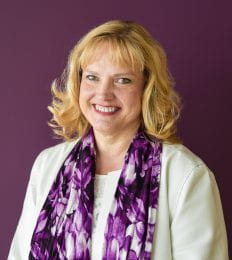
Royce Ann Collins, PhD, says education has always been her passion and calling.
Her career at K-State began as an instructor in 2005, and she worked her way up to being appointed a full professor in 2023. She currently serves as chair of the educational leadership department and is a professor of adult learning and leadership.
Dr. Collins began working with adult learners in higher education in 1992. She worked as the Director of Student Services which required her to serve as the academic supervisor to approximately 1,000 undergraduate and graduate students. These students, whose average age was 38, worked in the Kansas City area, and had to take courses in the evenings and weekends to improve their path.
“Working with adult learners is the most rewarding experience I’ve had. I worked to help them understand their own abilities to learn,” Collins said. “I helped them navigate the policy roadblocks of the institution and stay on course through the program to completion. Helping others believe in themselves and achieve their dreams is priceless.”
From Collins’s research and experiences, it’s apparent for her that if adult learners are going to work in a career while taking time to be a student, they need to see their path to graduation.
“From the time I talk with them as a prospective student, I try to help them see how they can be successful,” she said. “Adult learners need their schedules mapped out from the beginning so they can see the way forward. They are incorporating being a part-time student into their many responsibilities.”
Collins said she knows the key role an instructor has in student development. That is, by researching a student’s outcome, she sees that instructors who challenge students within their reach help them most.
In other words, according to Collins, as instructors think about the best way to support their students, they need to keep in mind Bloom’s taxonomy (an educational framework based on the idea that students need to begin by learning basic, foundational knowledge about a particular subject so they can advance to more complex methods of thinking). She says instructors also need to be cognizant ofthe level of questions they ask from discussion boards to class activities.
“Instructors develop student’s cognitive skills by starting at the student’s present level and continuing to stretch them to more advanced levels,” she said. “Instructors can have a mismatch with their students, and this just causes confusion, not growth.”
Collins has played an important role in K-State’s partnership with Fort Leavenworth. There, she finds that military-affiliated students are “the most driven and high performing learners” that she has had the privilege of mentoring and teaching as they work extremely hard.
Even when deployed, Collins’s military-affiliated students are still driven to finish courses and earn their degree.

“I also loved the challenge of teaching them; as a whole, these students will read, critically think, and dig up more information to bring back to class and probe more,” Collins said. “They’ll push back on a topic and make me dig more, read more, and think harder. That is what makes teaching fun.”
She credits the Adult Learning and Leadership program as instrumental in preparing these students to better understand, teach, and lead those they served and commanded.
“Graduates still tell me they use what they learned every day. To think that we are contributing to making the military better is an honor,” she said.
In recognition of her work and accomplishments, Collins has won national and regional awards for her teaching, research, and scholarship. Her awards include the College of Education, Michael C. Holen Excellence in Graduate Teaching, the Council for Accelerated Programs Lifetime Achievement Award for her leadership, advocacy and research on adult learners in higher education, specifically in accelerated formats, and the University Professional and Continuing Education Association’s Research and Scholarship Award. In 2013, she received an inaugural appointment to the Kansas State University Academy of Fellows.
“Education has always been my passion and calling,” Collins said. “The guiding principle for my career has been what can I do to help others achieve their dreams. I believe actions speak louder than words and I want my actions to open a door for someone to the world of learning.”